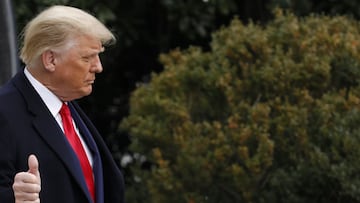Has President Trump signed a second stimulus check into law? When is the deadline?
The President is clearly unhappy with the new coronavirus stimulus and federal funding bill, but after months of negotiations in Congress can he change it at this late stage?


On Tuesday night President Donald Trump posted a video on his social media making clear that he is unhappy with the coronavirus stimulus and government spending bill passed by Congress. He suggested that he may refuse to pass the much-needed legislative package unless a number of changes are made.
The bill which he was referring to had been the result of months of negotiations in Congress and had triggered an extension last week to make sure that it could be passed before lawmakers break for Christmas. Trump’s late involvement may see the stimulus checks increased to $2,000 per person, but makes it less likely that they will be agreed before Christmas.
What has Trump said about the stimulus bill?
The video posted on social media sees Trump criticise elements of the omnibus bill, which includes both a covid-19 stimulus package and a government spending bill. He appears to have two main criticisms.
Insufficient stimulus checks
The main takeaway from Trump’s fireplace address was that he wants the direct payments to Americans to be bigger. He called on Congress to “amend this bill and increase the ridiculously low $600 to $2,000, or $4,000 for a couple”.
He has previously said that he wants larger stimulus checks that the Senate were offering, but has previously chosen to not get involved in negotiations. The Republican Party in the Senate have proved to be the main obstacle to larger stimulus payments in the past.
I’m for #StimulusChecks no matter who passes them. They would help millions of Americans and are a social and economic winner in a time of extreme need and desperation. Why would we treat people worse than we do banks and big companies?
— Andrew Yang🧢⬆️🇺🇸 (@AndrewYang) December 23, 2020
Additional funding for non-covid concerns
Part of Trump’s dissatisfaction seems to come from a misunderstanding of what the omnibus bill is for. As Congress attempted to beat the clock and get a stimulus bill and a government funding package agreed before Christmas, the two were combined in a single package.
Trump objected to funding for things like endangered fish breeding programmes and the Smithsonian museums, because he claimed they were not related to coronavirus. But these form just a tiny fraction of the government’s $2.3 trillion federal funding package.
Can Trump refuse to pass the bill?
The President has not yet confirmed that he will definitely veto the bill if it is not amended, but he is prone to taking drastic action if he feels it necessary. In response to his statement last night, a number of Democratic lawmakers have leapt on the opportunity to provide the additional assistance that they had been calling for. Speaker of the House Nancy Pelosi tweeted “Let’s do it”, referring to the potential change.
Let’s do it. @RashidaTlaib and I already co-wrote the COVID amendment for $2,000 checks, so it’s ready to go.
— Alexandria Ocasio-Cortez (@AOC) December 23, 2020
Glad to see the President is willing to support our legislation.
We can pass $2k checks this week if the Senate GOP agrees to stand down. https://t.co/GprwrUPali pic.twitter.com/nFFs1ExqCK
A late amendment proposed by Congresswomen Rashida Tlaib and Alexandria Ocasio-Cortez calls for Congress to “strike “$600 ($1,200 in the case of eligible individuals filing a joint return) and insert “$2,000 ($4,000 in the case of eligible individuals filing a joint return)”.
Related stories
If Congress does not pass this amendment, or something similar, then the President would only have one real option to prevent the bill being passed. Due to the overwhelming majority in both Houses who voted for the bill, Trump would have to exercise what is known as a ‘pocket veto’.
6) A President may in effect “veto” a bill by keeping it in his “pocket” and not signing it if it comes too close to the end of a Congressional adjournment.
— Chad Pergram (@ChadPergram) December 23, 2020
This would not see him officially dismiss the bill, but it would effectively push it into the next administration. Under Article I, Section 7 of the Constitution the President has ten days to make a decision on a bill. Failure to do so would result in it not being passed.